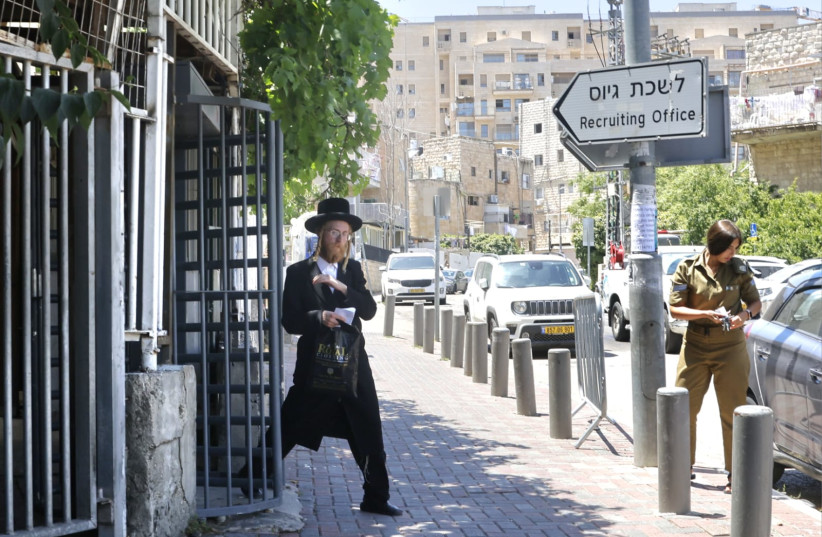The government needs to expand haredi recruitment into IDF
Laly Dery, wrapped in a scarf to fend off the winter cold, stood somberly outside the Knesset on Tuesday. Her voice, a mixture of fatigue and determination, called out: “We can’t carry this stretcher on our own.”
For Dery, whose son, Sgt.-Maj. (res.) Saadia Yaakov was killed in Gaza last June, the haredi (ultra-Orthodox) draft law is not merely a legislative debate; it is a moral must.
Marching from Mount Herzl to the Knesset in protest, she represented the pain and rage of thousands, demanding equal service.
“We find ourselves today in an existential war,” Dery said. “We don’t have time for discussion or debate.” Her message is painfully clear: The haredi draft law, as it stands, is a betrayal of Israel’s founding principle of mutual responsibility.
A bill pushed by Defense Minister Israel Katz would gradually bring tens of thousands of haredim into the IDF over a period of seven years. Katz said that 4,800 haredim would serve in 2025, climbing to 5,700 in 2026, and eventually 50% of eligible haredim in 2032. Yet those projections are at best aspirational.

As the IDF disclosed last week, just 338 haredim enlisted in the military’s new tracks out of 10,000 called up in recent months – a compliance rate of less than 4%.
“Even this objective,” the IDF said, “will have resulted in about 60,000-80,000 eligible men not drafted from this year and previous years.” Katz said his bill provides financial disincentives to individuals and yeshivot who fail to meet enlistment quotas, but critics, like MK Merav Cohen, have derided it as lacking.
The haredi elite argue that yeshiva students “protect Israel through their studies.” While Torah study is a pillar of Jewish identity, it cannot be an automatic exemption from national service.
In April, the High Court of Justice ruled that equality requires all spheres to share the burden of defense. Katz’s bill accordingly includes penalties, such as canceling subsidies for preschool and freezing funds for yeshivot that do not comply.
But the defense minister’s critics have raised questions about whether he is committed to enforcement. “The government has gone ahead and funneled huge amounts of money to the haredi communities in other ways,” the IDF said, “essentially subsidizing non-compliance.”
Hashmonaim Brigade was a positive step
The creation, earlier this month, of the Hashmonaim Brigade – a new combat unit meant to cater to the religious needs of haredi soldiers – was a positive step. “We know that this is only the start,” said recruit Moishy Weiner. “They have concerns about basic training… but the desire is very strong. We want to make history through doing.”
But standalone initiatives like that will not replace systemic change. “There is a huge amount of hype,” said Elroi Dalal, also a newcomer, “but we need this to work out on a larger level.”
The Israel-Hamas War revealed this unsustainable rift. Protesters such as Dery and Capt. (res.) Idan Siboni, who since October has served over 200 days of reserve duty, are not calling for a “melting pot,” but for solidarity. “We will ensure [haredim] will maintain their character,” Dery told the crowd. “But what we’re asking them to do is to become part of this nation; join the call for shared responsibility.”
This is not based on some ideological crusade, but on pragmatic necessity. “The IDF needs manpower. There’s unity that Israel needs,” Katz said in his presentation to the FADC, yet his bill does not respond to that urgent need for action. “In an existential war, everyone needs to carry the stretcher,” Dery warned us.
The government needs to be enforcing current laws and issuing effective sanctions, as well as expanding existing frameworks – like that of the Hashmonaim Brigade. But more importantly, it has to encourage a fast and vast shift within haredi society, showing that military service and keeping the faith are not contradictions.
As Katz himself said, “Enforcement is a broader social issue requiring political courage.” There will be no higher stakes. Anything short of this constitutes a dereliction of duty – to the IDF, to the nation, and to the memory of those who have already paid the highest price.





Comments are closed.